Ahmed Nejib Chebbi, Rached Ghannouchi, and Samira Chaouachi quotes are taken from interviews with the authors, June 29-30, 2022, Tunis.
On June 30, Tunisian President Kais Saied released the draft of a new constitution that will be put to a referendum on July 25, the one-year anniversary of his presidential coup. The document envisions an authoritarian, hyper-presidential system with few checks on Saied’s power. Even law professor Sadok Belaid, who wrote the first draft, said that Saied’s final version would “pave the way for a disgraceful dictatorship.”
As of now, most opposition parties plan to boycott the July 25 referendum, arguing the entire process of drafting the constitution has been illegitimate. With neither side showing any sign of compromise, Tunisia’s political crisis will continue, preventing joint action on its tail-spinning economy. While Saied is right that the pre-2021 system had its flaws, he has squandered an opportunity to find consensus around his political reforms, making it unlikely that his so-called “new republic” will have the legitimacy to stand the test of time.
A hyper-presidential system
Saied’s new constitution will considerably empower the presidency, unshackling what he called the “locks” on his power in the 2014 constitution. Instead of a two-headed executive where the president had to share power with a prime minister chosen by parliament, the president will now be the ultimate authority, choosing the prime minister, presenting laws to parliament, and appointing judges.
But Saied’s constitution goes much further than a simple presidential system, and instead removes almost all legislative and judicial checks on the president. Parliament can no longer impeach the president, with the new constitution dropping article 88 of the 2014 constitution. The legislature can still force the prime minister to resign (article 115), though only after a two-thirds vote (used to require a simple majority) and only once in its term — if parliament tries a second time, the president can dissolve parliament (article 116). The president’s state of emergency clause, which began this crisis on July 25, has been made even worse, with the parliament and constitutional court no longer having the power to end the president’s assumption of exceptional powers (article 96). Finally, the constitution drops article 101 of the 2014 constitution, stripping the constitutional court of the prerogative to interpret and adjudicate the president’s powers. As Saïd Benarbia of the International Commission of Jurists aptly summed up: the constitution “provides for an unbridled presidential system, with an omnipotent President, a powerless Parliament and a toothless judiciary.”
Moreover, the parliament seems intentionally designed to be weak. If the problem with the 2014 constitution was a divided executive, Saied’s constitution creates a divided legislature. Saied’s constitution envisions two parliamentary bodies: the traditional Assembly of the People’s Representatives is now accompanied by a new National Council of Regions and Districts — an attempt to enact the decentralized, bottom-up political vision that Saied ran on three years ago. Both chambers would have responsibility for passing the budget and exercising parliamentary oversight. Under the new constitution, members of both the assembly and the council will have only limited immunity, and could be prosecuted for slander or libel (article 66). At best, this system will be similarly divided, with too many overlapping institutions to govern effectively. At worst, the two parliaments will simply rubber-stamp a domineering president.
The identity of the state
There are a number of other changes in Saied’s constitution that likewise do not bode well for democracy. The 2014 constitution had codified the military and security forces as independent (“republican”) and impartial institutions (articles 18-19); however, Saied’s constitution removes these articles entirely — a worrisome development given his use of military courts to try civilians and police to repress protesters. Also missing are many of the independent bodies created in the 2014 constitution, such as the anti-corruption authority (INLUCC), the human rights commission, and the audio-visual communication commission (HAICA). The new constitution likewise removes judges’ right to strike, seemingly in response to judges striking for the past month to protest Saied’s purging of 57 judges on June 1.
The most surprising change in the constitution might be towards the role of Islam. While those involved in the drafting of the constitution had hinted at a more secular constitution, the final draft released by Saied is decidedly more Islamist. Article 5 notes that Tunisia is “part of the Islamic ummah,” and instructs the state “to work to achieve the objectives (maqāsid) of pure Islam,” which it specifies as life, honor, money, religion, and freedom. Such a clause is something the actual Islamist parties in Tunisia never dared to introduce. Tunisian analyst Mohamed Dhia Hammami suggests the new constitution could set “the foundation of a theocratic Islamic state.” Politically, this clause is likely to hurt Saied among the few parties and foreign governments still allied with him, all of which are anti-Islamist. Yet, Saied might be calculating that his core supporters, who he needs to turn out at the polls, might be more religiously conservative — they did, after all, support his opposition to equal inheritance and homosexuality in 2019.
Evaluation and prognosis
As important as the substance of a constitution is the process by which it was drafted — if done in an inclusive and consensual manner, it can secure widespread buy-in and legitimacy that allows it to outlast its creator. In this regard, Saied’s approach has failed miserably, having been drafted near unilaterally and behind closed doors. All of the major political parties, plus the powerful Tunisian General Labor Union, were excluded or refused to take part.
Each of the major political parties now plans to boycott the upcoming referendum, not wanting to grant it legitimacy through a higher turnout. Ahmed Nejib Chebbi, leader of the National Salvation Front, explained his decision to boycott as such: “This is a coup… The process has been described by the Venice Commission as something contrary to all the international standards, all constitutional principles. It’s an attempt to give false legitimacy to something which is and will be personal, absolute power.”
While the opposition might be able to block the constitution if they all agreed to vote no, they do not trust that the referendum will be free and fair. “We don’t have faith that it’s going to be a clean referendum,” observed Rached Ghannouchi, president of the Islamist Ennahda party and speaker of the dissolved parliament. “Why did the president change the electoral commission? Why did he change the electoral law? Why did he ban foreign observers? These are indicators that there is an intent to take control of the electoral process… The outcome is already known.” Samira Chaouachi, leader of the secular Qalb Tounes party and deputy speaker of the dissolved parliament, highlighted the lack of free speech: “The judiciary is being intimidated today… [Saied] has arrested many Tunisian bloggers, so he will be able to silence any voice against the referendum. This is illegitimate. We will not participate.”
With most of the opposition boycotting, Kais Saied’s new constitution is likely to pass on July 25. But his pyrrhic victory will be short-lived: the process of steamrolling through a new constitution will only serve to unite and expand the opposition — not grant his new republic any legitimacy. Tunisia’s political divisions will only deepen, and its crisis will worsen.
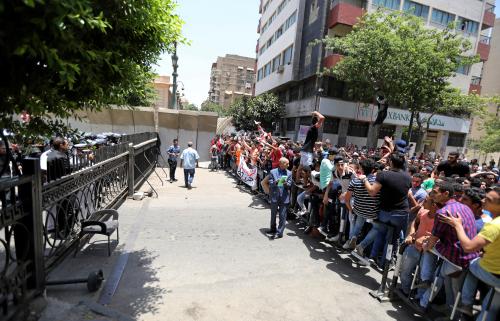
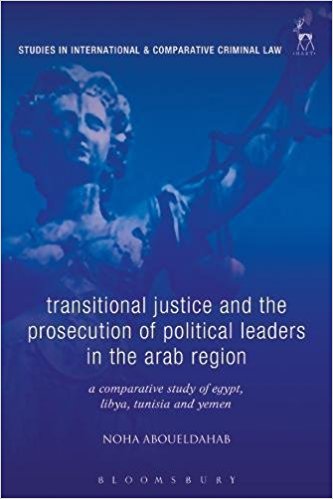
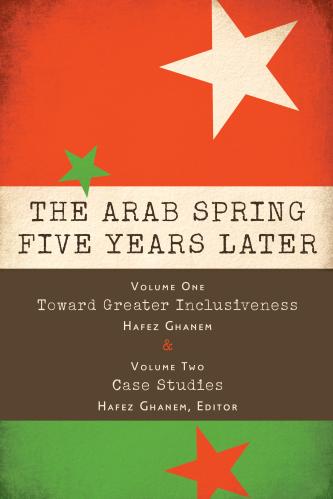
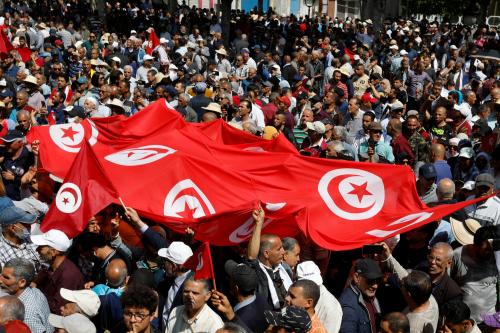
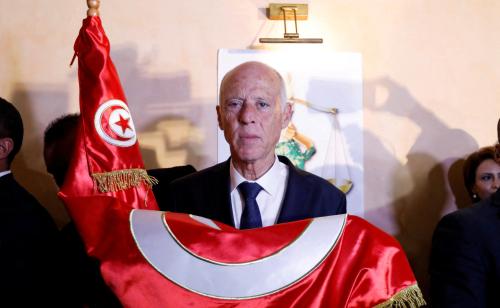
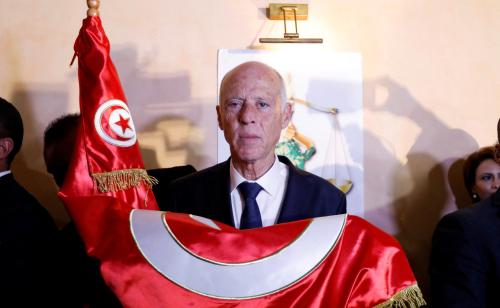
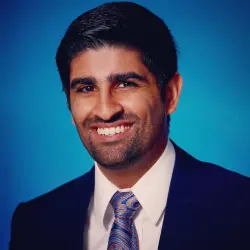


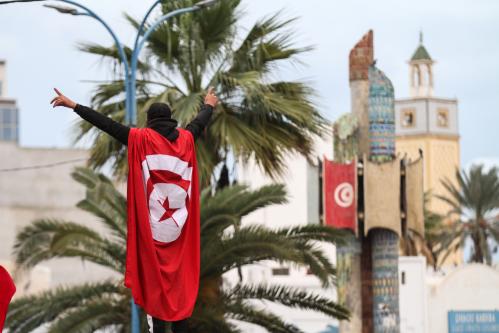
Commentary
Tunisia’s new constitution will only worsen its political crisis
July 6, 2022